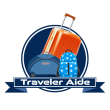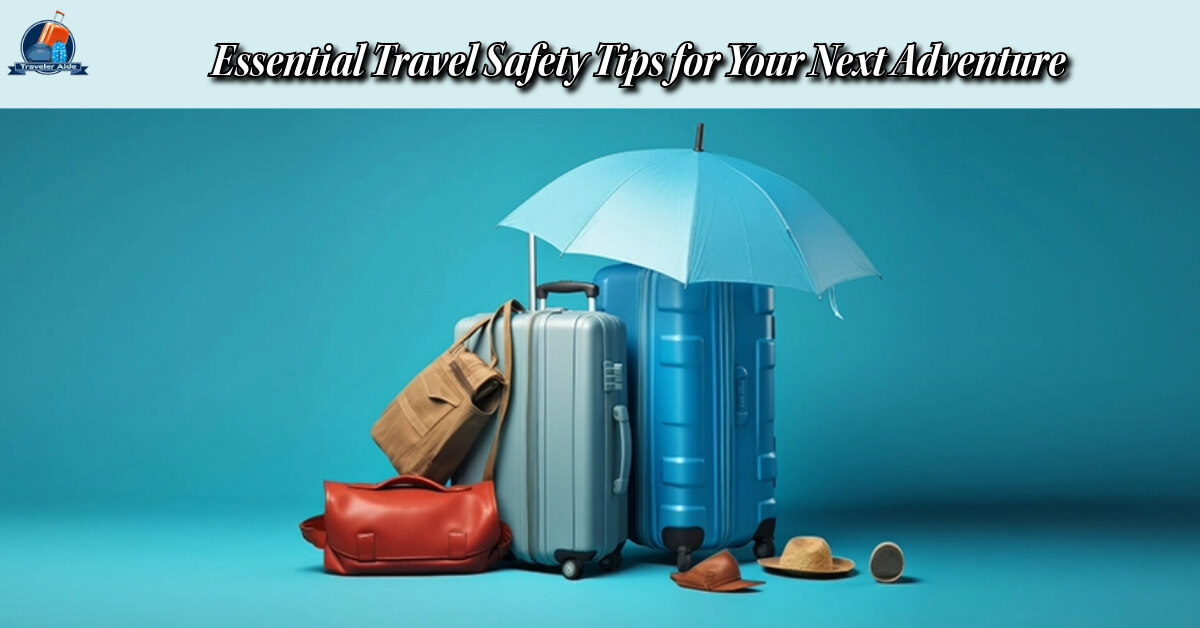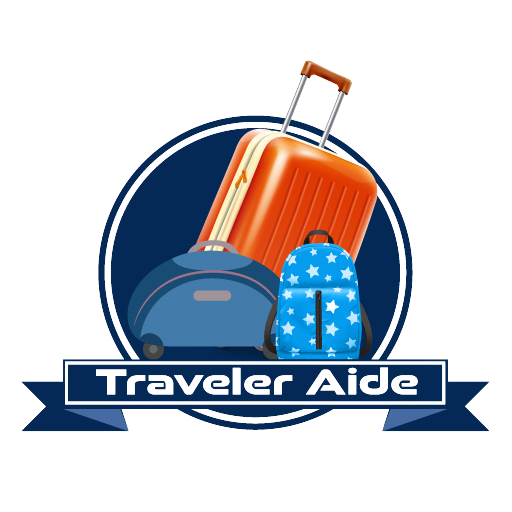Hey there, fellow travelers and adventurers! I’m excited to dive into a topic of traveler safety tips close to every wanderer’s heart: travel safety. When we set out on our journeys, the thrill of exploration often takes the spotlight, but I’m here to remind you that safety deserves a front-row seat in our adventures.
In addition to loving to travel, I’m very aware of how important it is to stay safe on the road. My name is Jeffrey C. Fields. Through my own experiences, I’ve learned a lot and seen how easy it is to fall into common mistakes that put our safety at risk. These mistakes, like not following local rules or advice about health risks or failing to keep our goods safe, can ruin our trips.
Now, let’s start this trip together! During your time here, I’ll give you ten crucial travel safety tips—tiny advice that can make a huge difference when exploring. Before we get into that, though, I want you to think about something important: how safety plays a part in our fun. It’s not just about crossing things off a list; it’s about having a mindset that ensures our experiences are exciting and safe.
Now that you have these tips, buckle up and pay attention because we will go through unknown territory with confidence and peace of mind.
Why is Travel Safety Important?
Safety while traveling is essential because it’s like having a quiet friend. It’s what makes sure your trip goes smoothly and is fun. When I put safety first, I don’t just keep myself safe from possible harm but also enjoy every moment of exploring without worrying. It’s like having a safety net that lets you try new things without worrying because you know you’ve done what you must to keep yourself safe.
Now, I’m exploring eight common mistakes while we are traveling.
8 Common Mistakes We Make While Traveling
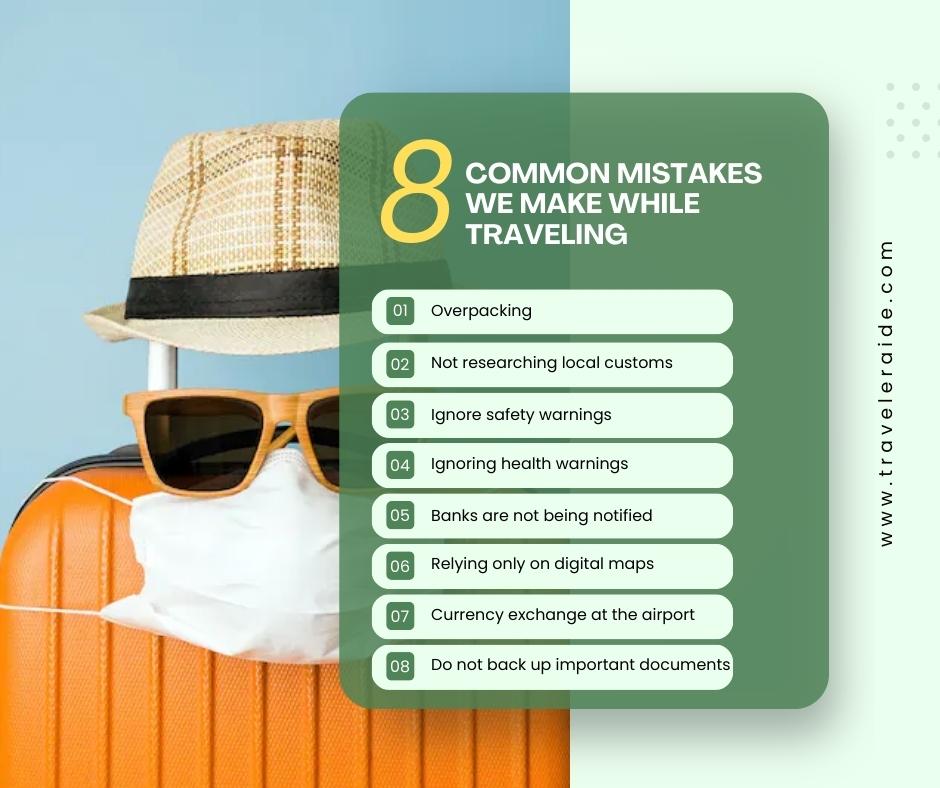
Here are eight mistakes that people often make when they travel:
Overpacking
It’s easy to bring too much stuff. It can be hard to move around when you have too many things packed. You might also need more space for gifts or things you find on your trip.
We Are Not Researching Local Customs.
You should know or respect the habits and customs of a place so you don’t upset or confuse the people who live there. To show respect and fit in, learning about cultural norms is essential.
Ignore Safety Warnings
You could be in danger without having to if you don’t listen to safety tips or warnings about the weather, politics, or specific places. These tips could save your life if you don’t follow them.
Ignoring Health Warnings
When traveling (experience enhancement), follow health advice about things like vaccines or possible health risks in certain areas to stay healthy and avoid getting sick.
Not Notifying Banks Or Credit Card Companies.
If you don’t let your bank or credit card company know, you might need help transferring or getting your money while away. This is the case because of safety steps set up to avoid scams.
Relying Only On Digital Maps
If you only use digital maps and don’t have a backup plan, like paper maps or a way to view them when you’re not online, it could be harmful if your device breaks or the service goes down.
Currency Exchange At The Airport
Swapping money at the airport might seem convenient, but there are usually more fees and worse exchange rates than in the city. You should plan and learn about foreign exchange.
We Are Not Backing Up Important Documents.
Important papers like passports, IDs, travel insurance, and plans could get lost or stolen, messing up your trip if you don’t make copies or backups of them.
Now, I’ll discover the ten most important safety tips for traveling that everyone should know.
10 Essential Travel Safety Tips (Everyone Needs To Know)
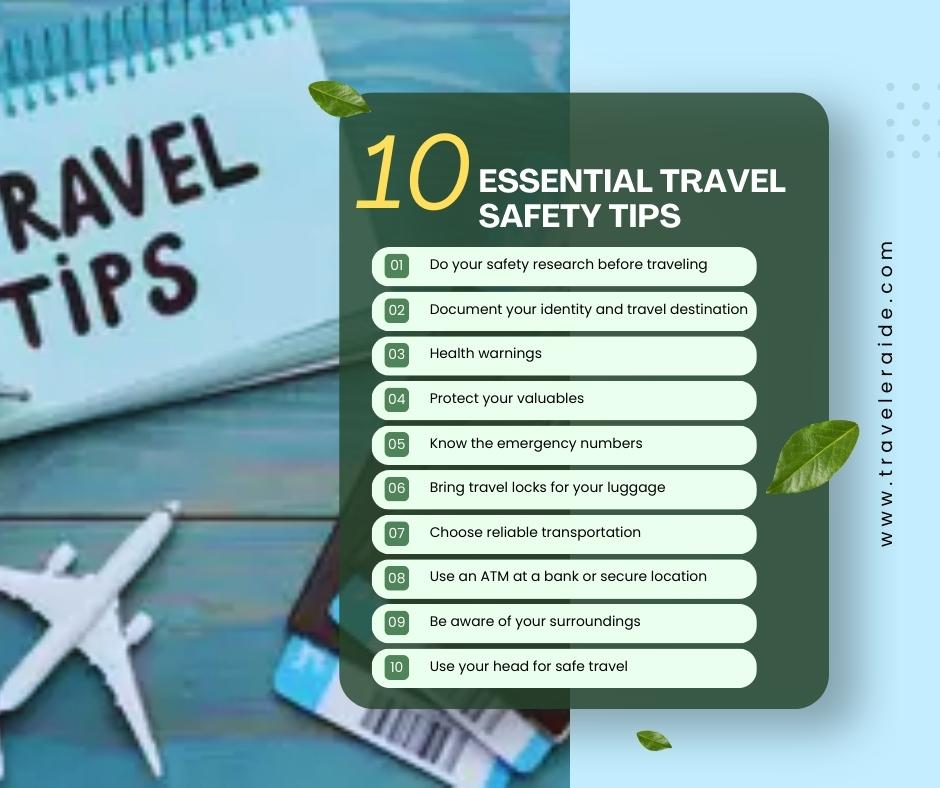
Here are ten tips that every tourist should know:
Do Your Safety Research Before Traveling.
Use reputable sources like government websites, travel safety tips (for survival), and travel books to learn about your trip. The rules, customs, health risks, and safety tips unique to the place should be understood. It can help you be polite and straightforward if you know about the local norms and ways of life.
Document Your Identity And Travel Destination.
You should make digital copies of your passport, visa, trip insurance, schedule, and other essential documents. These files are safe to keep in the cloud or share. Also, keep hard copies of your necessary papers somewhere other than where you keep the originals. With this, you can still access important data even if you lose or have your originals stolen.
Health Warnings
Make sure you know about any health warnings or shots you need for the place you’re going. Bring any drugs, first-aid supplies, bug spray, or other health-related items that are recommended for the area. Learn about the health risks that might be out there so that you can be safe when you travel.
Protect Your Valuables
Get anti-theft bags, money belts, or secret pouches to keep your things safe while you travel. These will help keep your money, IDs, and electronics safe. If you don’t need something, put it in a hotel safe or a secure place in your room to keep it from getting stolen.
Know The Emergency Numbers.
When you need to call for help, remember or write down the numbers for the police, the fire department, medical services, and the office or embassy of your country. It can be essential when you need to call these numbers quickly.
Bring Travel Locks For Your Luggage.
Use TSA-approved locks (reset) on your bags to keep people out who don’t have your permission. You should get locks with unique keys or combinations to keep your things safe while away or at home.
Choose Reliable Transportation
Study and pick a way to get around with a good safety track record. Safety and reliability should come first when you take the bus, use a ride-sharing service, or rent a car. Only use transportation that has been cleared and is under control to ensure your trip is safe.
Use An ATM at A Bank Or Secure Location.
When you use an ATM, be careful and only do so in well-lit, secure places, like banks or other well-known businesses. Before you use the ATM, look for signs that someone has tampered with it and hide your PIN so it can’t be stolen.
Be Aware Of Your Surroundings.
Keep an eye on what’s happening around you, and stay alert. Stay aware when you use your phone or headphones too much in strange places. Trust your gut and leave places or situations that scare you or make you nervous.
Use Your Head For Safe Travel.
During your trip, make intelligent decisions and put your safety first at all times. Pay attention to what’s happening in your area, understand other cultures, and use your common sense to figure out what to do. Trust your gut and do your best to ensure your trip is fun and safe.
Here are some answers to frequently asked questions about travel safety tips.
FAQs On Traveler Safety Tips
How Can You Make Sure Tourists Are Safe?
Tourists will be safer if local governments set clear safety measures, give accurate information, and teach people about possible risks. Tourists can help by getting to know the area, following the rules, and telling the authorities about activities that must be corrected.
How Can I Get The Most Out Of My Trips?
Pack light, drink a lot of water, and tell people about your plans before you go. Meeting people from the area can also keep you from falling for scams or being robbed. For example, you can get help by downloading apps that tell you how to get somewhere or translate languages.
What Is The Most Important Thing To Bring When You Travel?
Your trip will go well if you change your mind and stay open. Take a moment to enjoy the trip and be open to what might happen. Remember that what you do and the people you meet are often more important than sticking to a plan.
How Do You Stay Safe When You’re Traveling By Yourself?
Trust someone enough to tell them about your plans, and check in often. Also, trust your gut. Don’t go to places alone at night, and be careful around people you don’t know. A great way to meet other guests and feel better is to go on trips or do things with a group.
One Last Thought
Key Takeaways:
- Having fun is important, but safety is even more important when you travel. If you follow health tips or bring less, things could go badly on your trip.
- Ten safety tips are to stay healthy, research, keep copies of essential papers, keep your stuff safe, know emergency numbers, use locks, choose safe transportation, stay alert, and trust your gut.
- How can states help tourists? What can tourists do to have a great trip? How can people who are traveling alone stay safe?
- Keep in mind that safety is paramount for a good trip. Keep cool, don’t do what other people do, and confidently enjoy your trips.
Finally, I would like to say that knowing the poisons before traveling is essential to staying safe. Safety is required for a fun and easy trip. Refrain from doing terrible everyday things, like taking too much or not listening to your doctor. When you go alone, stay in touch, be careful, and put events ahead of a tight plan. Stay safe, learn as much as possible, and have a great time on your trips. Anyway, if you want to know anything, please let me know through comments.

Jeffrey C. Fields is an experienced travel writer passionate about uncovering the world’s hidden gems. With years of global exploration, he shares unique insights into diverse destinations, offering readers a fresh perspective on our planet’s beauty.
